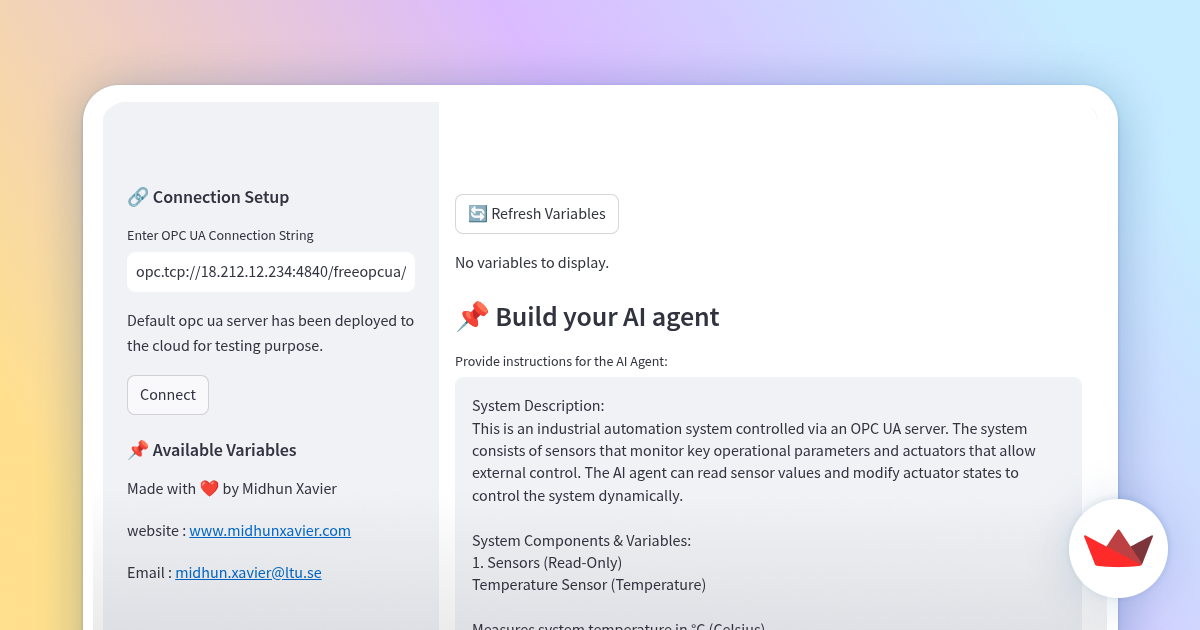Table of Contents
Overview
In the ever-evolving landscape of industrial automation, staying ahead requires embracing cutting-edge technologies. AI Agents for Machines offers a compelling solution for businesses looking to infuse intelligence directly into their machinery. This platform empowers developers to create sophisticated agents that can monitor, control, and optimize industrial processes in real-time. Let’s dive into the details of what makes AI Agents for Machines a noteworthy contender in the industrial AI space.
Key Features
AI Agents for Machines boasts a robust set of features designed to seamlessly integrate with existing industrial infrastructure:
- OPC UA, MQTT, REST, ROS support: Offers broad compatibility with various industrial communication protocols, allowing for easy integration with diverse machinery and systems.
- Real-time data monitoring: Provides continuous, up-to-the-second insights into machine performance and operational parameters.
- Customizable agent actions: Enables users to define specific actions and responses based on sensor data, allowing for tailored control strategies.
- Scalable deployment: Designed to handle deployments ranging from single machines to large-scale industrial operations.
- Cross-platform protocol integration: Facilitates communication and data exchange between different machines and systems, regardless of their underlying protocols.
How It Works
The core concept behind AI Agents for Machines is straightforward yet powerful. Users develop intelligent agents that act as intermediaries between the platform and the physical machinery. These agents connect to machines using supported protocols like OPC UA, MQTT, or REST. Once connected, the agents continuously read live sensor inputs, such as temperature, pressure, or vibration. Based on these inputs and pre-defined rules or learned behaviors, the agents can then issue commands to actuators, controlling machine operations and executing tasks. This allows for automated responses to changing conditions and proactive optimization of industrial processes.
Use Cases
AI Agents for Machines opens up a wide range of possibilities for improving industrial operations:
- Industrial automation: Automate repetitive tasks, optimize workflows, and reduce manual intervention in manufacturing processes.
- Predictive maintenance: Analyze sensor data to identify potential equipment failures before they occur, minimizing downtime and maintenance costs.
- Process optimization: Fine-tune machine parameters and control strategies to maximize efficiency, reduce waste, and improve product quality.
- Machine control via AI: Implement AI-powered control algorithms to optimize machine performance in real-time, adapting to changing conditions and demands.
- Remote monitoring: Monitor machine performance and operational parameters from anywhere, enabling remote diagnostics and troubleshooting.
Pros & Cons
Like any technology, AI Agents for Machines has its strengths and weaknesses. Let’s take a closer look:
Advantages
- Protocol versatility: Supports a wide range of industrial communication protocols, ensuring compatibility with diverse machinery.
- Real-time responsiveness: Provides immediate feedback and control, enabling rapid responses to changing conditions.
- Customizable workflows: Allows users to define specific actions and responses, tailoring the platform to their unique needs.
Disadvantages
- Niche use case: Primarily focused on industrial applications, limiting its applicability to other domains.
- Technical expertise required: Requires a solid understanding of industrial protocols and AI concepts.
- Unclear support or documentation: Information regarding support and documentation availability is limited, which could pose a challenge for new users.
How Does It Compare?
When considering AI Agents for Machines, it’s important to understand its position relative to other solutions in the market. Siemens MindSphere, for example, offers a broader industrial IoT platform with a wider range of features, but it may lack the specific AI agent tools provided by AI Agents for Machines. Ignition by Inductive Automation excels in SCADA (Supervisory Control and Data Acquisition) but doesn’t offer the same level of AI-driven agent capabilities. AI Agents for Machines carves out a niche by focusing specifically on intelligent agents for machine control and optimization.
Final Thoughts
AI Agents for Machines presents a compelling solution for industrial companies seeking to leverage AI for machine control and optimization. Its protocol versatility, real-time responsiveness, and customizable workflows make it a powerful tool for improving efficiency, reducing downtime, and enhancing overall operational performance. While the niche focus and potential challenges with support and documentation should be considered, the platform’s potential benefits make it a worthwhile option for those with the necessary technical expertise and a clear vision for its application.
https://aiagentformachines.streamlit.app/